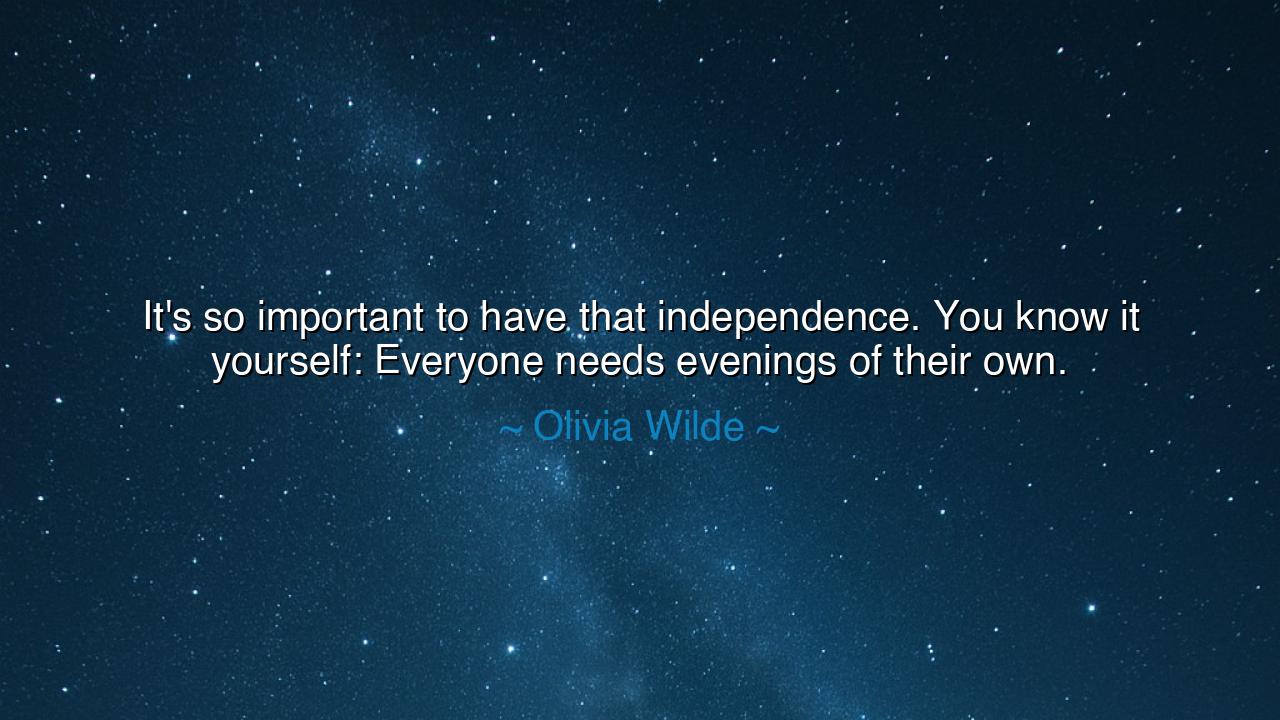
It's so important to have that independence. You know it
It's so important to have that independence. You know it yourself: Everyone needs evenings of their own.






The Sanctuary of the Self
Hear now the gentle wisdom of Olivia Wilde, who spoke not as a ruler or philosopher, but as one who knows the quiet struggles of the heart:
“It’s so important to have that independence. You know it yourself: Everyone needs evenings of their own.”
Though her words seem simple, they shine with a timeless truth—the truth that every soul requires a sacred space of solitude, a place where one may return to oneself after the noise of the day. For without solitude, independence withers; and without independence, the self forgets its shape. Her saying is not about rebellion, but about restoration—the art of being alone without being lonely, of retreating not in fear, but in reverence for one’s own being.
The Meaning of Independence in Stillness
In this modern age of constant movement and unending communication, Wilde’s reminder strikes with the quiet force of an ancient bell. To have “evenings of one’s own” is to reclaim one’s inner rhythm—to step out from the tide of obligations, conversations, and expectations, and breathe the air of one’s own thoughts.
The ancients knew this truth well. The philosopher Seneca wrote that one who cannot find peace in solitude will never find peace in the crowd. He and Wilde speak of the same virtue: that true independence is not loud or defiant—it is internal, a calm mastery of one’s time and spirit. The world will always demand; only the wise learn when to withdraw.
The Example of the Ancients
Recall the story of Marcus Aurelius, the philosopher-king of Rome. Surrounded by armies, courtiers, and the endless duties of empire, he wrote his Meditations not in triumphal halls, but in the silent hours before dawn. Those private writings—his “evenings of his own”—were the soil from which his wisdom grew. It was in solitude that he found strength, not in the adoration of the multitude.
Thus, Wilde’s words echo across centuries: even in lives filled with noise and love and labor, one must keep a chamber within—a space untouched by others, where the flame of self-awareness burns undisturbed.
The Balance of Togetherness and Solitude
Yet her words also speak to the rhythm of human connection. Wilde, an artist and mother, knows that independence does not mean isolation. It means having boundaries that preserve the vitality of love. For love that consumes completely becomes possession; friendship that never yields to silence becomes dependence.
In her wisdom, she reminds us that both the heart and the mind must rest, that balance is the lifeblood of freedom. Just as the sea withdraws each night only to return with greater strength, so too must every soul withdraw from others to renew its power to give.
The Emotional Truth Behind the Words
There is tenderness in Wilde’s confession: “You know it yourself.” She does not command; she empathizes. She speaks to a truth that all humans feel but few honor—that exhaustion is not weakness, and that the longing for solitude is not selfishness, but necessity. To be constantly surrounded by others, even those we love, is to lose the thread of our own voice.
Those evenings of one’s own are not luxuries, but lifelines. They allow the soul to breathe, to dream, to heal from the thousand small compromises of daily life. Without them, the spirit becomes crowded, and joy fades into weariness.
The Modern Echo
In our world, where light never dims and conversation never sleeps, we risk forgetting the holiness of stillness. Wilde’s words call us back to the ancient rhythm of life—the alternation between engagement and retreat, between the sunlit day of duty and the twilight hour of self-reflection.
We see the same principle in nature: the forest rests at night, the tides withdraw, even the stars move behind clouds to make way for dawn. So too must we honor the ebb and flow within our own spirits, lest we burn the flame of life too quickly.
The Lesson for All Souls
Learn, then, O seekers of balance: independence is not the rejection of others, but the renewal of oneself. To love deeply, one must first stand firmly within one’s own being. To give freely, one must not give away the soul. So carve your evenings out of the noise of the day. Turn off the world. Sit with your own heart.
Let those quiet hours become your sanctuary. Write, read, walk, or simply breathe. For it is in solitude that you rediscover your strength, your clarity, your purpose. And when you return to the world, you will do so not weary, but whole.
For as Olivia Wilde reminds us, everyone needs evenings of their own—not to escape life, but to meet it again with a soul refreshed, a heart renewed, and a spirit fully awake.






AAdministratorAdministrator
Welcome, honored guests. Please leave a comment, we will respond soon